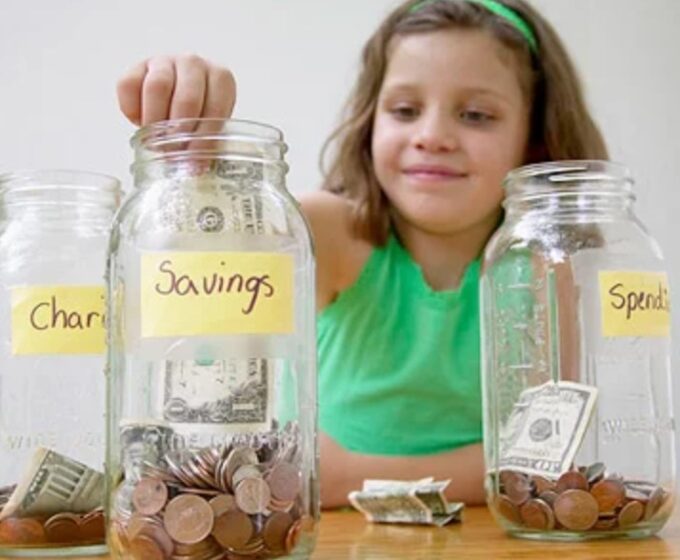Money management is a vital skill for adults, but if we expect young people who are newly out on their own to understand how to approach financial issues, education needs to start early – but obviously, you can’t teach toddlers how to balance a checkbook.
What, then, does a lifelong approach to financial education look like and how can parents integrate it into daily life?
It’s all about choosing age-appropriate strategies that include the development of numeracy skills, offering opportunities for practicing basic tasks like saving and budgeting, and talking openly about finances so that, by the time your child is old enough to manage their own money, they feel confident that they know what to do.
1. Early Childhood: Understanding Value

Any experienced early childhood educator can tell you that the child who will be successful in math isn’t necessarily the preschooler who can already count to 100, which is a rote task, but is actually the child who understands that six is bigger than four. That’s because understanding value, proportionality, and the relationships between numbers – what is bigger or smaller, greater or less – is a big part of what early math education is about.
Start early by playing games where children pick out larger and smaller objects, use toys that represent size and value relationships, and show your child real-life examples of these differences in places like the grocery store using different packages. As you child gets a little older, around preschool and kindergarten, you can begin working on money recognition.
Math for children is very important because it forms the necessary qualities for the development of business skills in a child. Mathematical skills will also allow your child to learn how to structure his thoughts.)
This is a little trickier since the value of a coin or dollar isn’t represented by its size. Teach them how to match and group coins, exchange them for other coins or bills of matching value, and let them practice picking out the right coins for small purchases or counting your change at the grocery store.
2. Elementary School: Offer An Allowance

By the time your child is in elementary school, they’re old enough to start completing household chores in exchange for an allowance. You can approach this in a variety of ways based on your family’s ability and your child’s skills, but the key is to use these regularly payments as the foundation for lessons on saving, spending, budgeting, and even investing.
For example, if you give your child a weekly allowance, once a month you might sit down together and set goals and divide that money into different categories. They can choose something they want to buy, some money to save, and some money to invest or donate to an organization they care about, like a local animal shelter.
During elementary school, you may also want to take your child to the bank and set up a savings account together. Many parents do this even earlier, before their child is old enough to be part of it, and that’s okay too. However, then you should still show your child their account information, talk about how you began saving money for them, and begin including them in the process of making deposits and recording their account information.
3. Tweens: Spending Matters

By the time your child is headed into middle school, they’ll undoubtedly be interested in making purchases, but they’re also at a very impulsive age, especially when they feel the need to keep up with their peers. That’s why tweens are at a great age to learn more about tasks like comparison shopping.
Comparison shopping can be a lot of fun for tweens because it’s easy to gamify. Whether you’re at the grocery store trying to find the cheapest bag of chips or comparing the price of cookies with how much you actually want them, or using the internet to look for the best price on a popular video game, spending less to get the same item or to buy more items overall can be really satisfying. Another topic you may want to start addressing with your teen in a more in-depth way is the family budget, because there are a lot of hidden costs to adult life.
That doesn’t mean bringing your child into conversations about your financial struggles if, for example, you’re having a hard time paying the bills – that’s a concern that needs to be handled carefully and with emotional sensitivity – but kids don’t always realize that in addition to buying clothes and groceries and material items like that, that you have to budget for housing and utilities and immaterial concerns like taxes. Many of us have been raised to think that talking about finances is impolite and not something you do, but failing to do so can have long-term consequences.
4. Teens: Let Them Practice

Teens have a surprising amount of spending power in our economy, whether or not your child has a job, and as your child gets closer to heading out on their own, it’s important that you give them a meaningful chance to practice independently managing their spending habits. On the flipside, though, you also don’t want to give them too much freedom and find they’ve created serious financial problems – but luckily there are tools that can help you do this.
Beyond simply giving your child spending money in cash and letting them manage it on their own, you might consider equipping the young person in your life with a teen debit card; you can learn more at greenlight.com. Instead of linking to all the money in a bank account, a teen debit card provides access to a more limited portion of funds, helps young people manage their saving goals, and even offers modern banking benefits like cash back on spending.
Remember that by the time your teen leaves for college, they need to be able to handle much more of this responsibility independently, so a tool like this can be greatly beneficial for helping them start to navigate these waters.
It’s Never Too Early To Start
Many parents are hesitant to talk to their kids about money, and then they’re surprised and disappointed when their children find themselves in debt or struggling to pay the bills or manage their credit cards, even though they never taught them how.
It’s a troubling contradiction, but a preventable one, and it’s never too early – or too late – to start talking about money. Any financial education and experience you can offer your children will give them a financial edge in the long-term and help them develop skills we all need.









